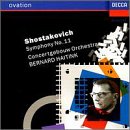| All Artists: Shostakovich, Cgb, Haitink Title: Symphony 11: Year 1905 Members Wishing: 0 Total Copies: 0 Label: Decca Release Date: 8/8/2000 Album Type: Original recording reissued Genre: Classical Styles: Historical Periods, Modern, 20th, & 21st Century, Symphonies Number of Discs: 1 SwapaCD Credits: 1 UPC: 028942507227 |
Search - Shostakovich, Cgb, Haitink :: Symphony 11: Year 1905
 | Shostakovich, Cgb, Haitink Symphony 11: Year 1905 Genre: Classical
|
Larger Image |
CD Details |
CD ReviewsA stunning performance of a masterpiece Bruce Hodges | New York, NY | 04/16/2002 (5 out of 5 stars) "This was one of the first Shostakovich symphonies I ever heard after the popular Fifth, and I found it a revelation. It is not easy listening, but the score is one of the composer's best, filled with virtuosic orchestral demands and nightmarish effects. The symphony's four movements are played without pause, and the tension created is almost unbearable. Haitink plays it a bit cool here; some listeners may want a more typically Russian extroverted approach. But his comparatively laid-back style only makes the horror in the music - an almost casual brutality - stand out more.The superb playing of the Concertgebouw Orchestra will knock you out (and your neighbors, should you turn up the volume). Many people swear by the classic version of this piece by Stokowski and the Houston Symphony, but this recording is a great achievement, one of the finest in Haitink's renowned Shostakovich cycle from the 1980's." Great interpretation of a convincing symphony! Tim Hawkins | Rochester, NY USA | 10/27/2001 (5 out of 5 stars) "Shostakovich's eleventh is a work that demands your full attention as you listen. The thematic material on which it is based (the Revolution of 1905) is not something to be taken lightly, and Shostkakovich lets you know that in this symphony. Maestro Haitink's Shostakovich cycle is the best I've heard due to his wondeful interpretaiton and perfect tempos. This symphony is the best that he did in this cycle, with the Concertegobow symphony orchestra brandishing its full potential. The brass is incredible, especially in the powerful second movement and the awesome Tocsin finale. The horror of the time is all that this symphony is about and any listener can actually feel the history pass as they listen. Be prepared for energetic sound and a sure-to-please addition to your Shostakovich collection. A+ is the grade." Encore Shostakovich ! Jeffrey Lee | Asheville area, NC USA | 01/12/2003 (5 out of 5 stars) "More highly commendable Shostakovich presented by Bernard Haitink and the Amsterdam Concertgebouw. Both the air of sporadic mystery and the sense of foreboding are boldly projected with satisfying clarity. Listen, for example, to the playing of the Concertgebouw in those passages depicting the "Bloody Sunday" massacre, where that typically solid, virtuostic style of this famed orchestra shows through as it has on many other recorded occasions. The third movement's "In memoriam" sings appropriately and purely, without conveying any feeling of over-emphasis or exaggeration. There is also a well represented depiction of both the tragedy and humility surrounding the event. In the final movement, Haitink does a fine job of expressing, through the composer's mind, the sense of concern about what lies ahead for Russia's soul. Well deserved praise for both the musicians and the recording crew."
|

 Track Listings (4) - Disc #1
Track Listings (4) - Disc #1